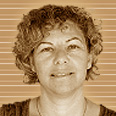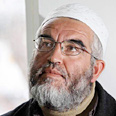
Vered Livne
Photo: Eyal Livne

Raed Salah
Photo: Haim Zach
Sheikh Raed Salah is a zealot whose views are dangerous and on occasion encourage violence. He does not miss out on opportunities to convey hostile messages towards Israel
and encourages chasms and hatred. Most of the Jewish public in Israel feels threatened by his declarations, and rightfully so for the most part. However, Sheikh Salah is not the Arab community’s mouthpiece in Israel; he represents one branch in one movement that itself does not boast one unified voice.
Most of the time, the majority of Israeli media outlets follow a conception of presenting Arab citizens as “a threat on the Jewish majority.” Extreme declarations, fiery eyes, raised fingers and threatening texts all make for a good photo opportunity for the evening newscasts and make sure morning newspapers sell well. The media make no effort to present the diversity of opinion and complexity of the Arab community. As if this community has no Left and Right, religious and secular, young and old, conservatives and liberals - “there,” everyone is Arab, and as a result, everyone holds homogenous, radical views.
Yet despite this, in recent weeks the sheikh seemed like the only spokesperson on behalf of Arabs in Israel. Without looking into the question of the government’s conduct in the matter of the Mugrabi Gate construction, an average newspaper reader and television viewer could have easily believed that 1,200,000 people were standing behind Salah and were only an order away from an all-out strike at the country. In practice, no mass demonstrations took place and the majority of the Israeli Arab community did not follow his harsh calls.
Incitement Charges
Efrat Weiss
Leader of Islamic Movement and four others indicted on public disorder charges and attacking police during riots over constructions near the Temple Mount last Wednesday
Had media outlets initiated polls among the Arab community as well, we would have see a wide variety of views, and it would have turned out that the northern branch of the Islamic Movement enjoys very limited support; we would see that there are many Arabs in Israel who do not see Sheikh Salah and his views as representing them and their own positions. Yet even in pre-election polls showing support for the various parties, the Arab parties appear as one group. There’s no Hadash or National Democratic Assembly or United Arab List, only the “Arab bloc.”
Clinging to stereotypes
If there is a rise in Raed Salah’s popularity among Arabs in Israel and abroad, he should also be thanking the Israeli media (and leadership) for their conduct.
This would not be the first time where we glorify and nurture our greatest enemies while pushing away those who want to be close to us, and later, just like a self-fulfilling prophecy, we repeatedly reinforce the sense of existential threat. If we only continue to address the radical declarations instead of cooperating with a responsible leadership – like that of the Arab Israeli Monitoring Committee – we would also be bearing some of the responsibility for the growing popularity of radicals.
Responsible media outlets that fulfill their professional duty to present to the public all relevant information needed to formulate a worldview must expend and diversify the coverage of Arab Israeli citizens. They have to turn the masses into individuals and make an effort when there is a need to read between the lines. They have to listen to the various voices and also to the nuances that are hidden from view – and that way bring the real story.
As long as this doesn’t happen and we choose to cling to a stereotype that enhances our sense of threat, the radicals’ success is guaranteed. If we have an interest in and courage to familiarize ourselves and understand what is really happening, the road to understanding and cooperation could be much shorter than we think.
The writer is the director of Agenda, an Israeli center for media strategy















